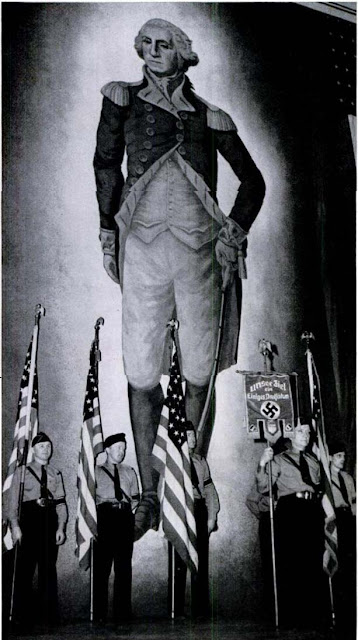by Nomad
 |
(From Mad Magazine, 1968) |
 |
(From Mad Magazine, 1968) |
 American author Thomas Wolfe's travels through 1936 Nazi Germany comprised part of his posthumous novel. Excerpts from the book reveal the ways a society can adapt to the unstoppable approach of a brutal regime.
American author Thomas Wolfe's travels through 1936 Nazi Germany comprised part of his posthumous novel. Excerpts from the book reveal the ways a society can adapt to the unstoppable approach of a brutal regime.
At approximately 10:30 hours on April 23, 1945, the first U.S. troops of the 90th Infantry Division arrived at Flossenburg KZ,. They were horrified at the sight of some 2,000 weak and extremely ill prisoners remaining in the camp and of the SS still forcibly evacuating those fit to endure the trek south. Elements of the 90th Division spotted those ragged columns of prisoners and their SS guards. The guards panicked and opened fire on many of the prisoners, killing about 200, in a desperate attempt to effect a road block of human bodies. American tanks opened fire on the Germans as they fled into the woods, reportedly killing over 100 SS troops.
 The United States has had its share of fascist groups that have come and gone. One of those was the American Nazi Party, the Bund Party. Here's the story of its 1939 rally and how it led to its collapse.
The United States has had its share of fascist groups that have come and gone. One of those was the American Nazi Party, the Bund Party. Here's the story of its 1939 rally and how it led to its collapse.  by Nomad
by NomadFranklin Roosevelt and the New Deal quickly emerged as the object of their most intense domestic scrutiny. Fundamentalists sensed something sinister in the thirty-second president. His consolidation of power, his controversial policies, and his internationalist sensibilities seemed consistent with biblical descriptions of politics and international relations in the last days.As a result, fundamentalists did not interpret the growth of the modern liberal state in the U.S. as a reasonable response to the growing global economic depression but instead viewed it in conjunction with Mussolini’s visions of empire and Hitler’s Antisemitism. In short, fundamentalists across the continent came to believe that New Deal liberalism was the means by which the U.S. would join the legions of the Antichrist.